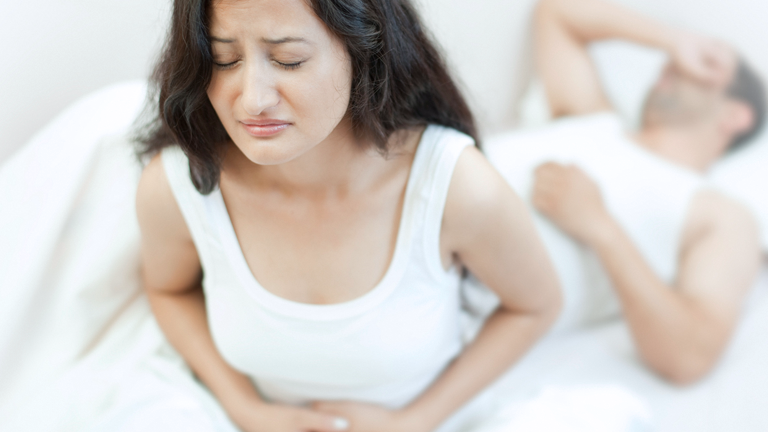Does it hurt when you have sex? Not to worry. NHS GP Dr Preethi Daniel has expert advice to help find the cause of pain and improve your sex life
Moans turning to groans. Pleasure becoming pain. Nothing can turn you off quicker than experiencing unwanted and uncomfortable pain during sex. There has been an increase in experimentations with pain and pleasure in the bedroom (thanks to a popular series of naughty books). But when the pain is unintentional it can be a sign that something, psychologically or physically, is not quite right. The medical term for pain during sex is dyspareunia, which is derived from the early Greek language and translates to ‘difficulty mating’ linking directly to the problem at hand. Pains linked to sex are generally located in the vagina or lower stomach and can range from a dull ache to a stabbing or burning sensation.
These are generally not a cause for concern and most pains can be identified and treated by your doctor, so if you are worried it is best to book an appointment. Normally there is an easy fix for these issues, however, should there be something a bit more serious you doctor will be able to advise the best course of action. If you are experiencing any pain or discomfort however here is a quick rundown of what may be to blame:
An infection– Even the simplest infections such as thrush or a sexually transmitted infection (STI) can cause discomfort during sex. STI’s such as chlamydia, gonorrhea and genital herpes are easy to diagnose and treat when identified early. Therefore, it is very important to get tested regularly especially if you have multiple sexual partners.
Menopause- A change in hormone levels can cause your vagina to become dry which can make sexual intercourse difficult and painful. This is easily remedied with over the counter lubricants, it is better to use water-based ones rather than silicone based. If this doesn’t work it may be worth having a trip to your doctor’s office, they may be able to prescribe oestrogen creams to help promote lubrication.
Sexual arousal or psychological factors- This can happen at any age and all comes back down to being lubricated enough. Women’s bodies naturally self-lubricate, however, if you are breastfeeding or nearing menopause then you may find you need a little assistance. If that is not the case, it may be that you need a bit more of a ‘warm-up’ before jumping to the main event (yep, that means foreplay!).
Vaginismus – This is a physical condition where muscles in the vagina contract making sex painful or impossible. Some physical conditions such as this may link to a psychological issue, women can negatively associate penetration to a past trauma or abuse. Discussing any issues with a specialist or gynaecologist can help to identify and deal with any physical or psychological issues. Counselling and cognitive behaviour therapy have also shown positive results for this.
Genital irritation- Allergies to products such as spermicide, latex condoms or perfumed soaps and shampoo can lead to irritation around the vaginal area, causing physical discomfort during sex. This can be remedied by identifying the product you are having a reaction to and either finding an alternative or no longer using it.
Surgery/childbirth- If you have just undergone surgery, or given birth, the recommendation is to wait at least six weeks after childbirth before having sexual intercourse as this could lead to discomfort or can lead to complications with recovery.
Genital fit- You can’t fit a triangle into a circle. Also, if you are petite or particularly tight and your partner is well endowed then penetration may not be the most comfortable of experiences. There are fixes for this too. Talk to your doctor if you feel you may be very tight.
If you are experiencing pain during sexual intercourse, the best thing you can do for your body is to take a break. Do not try persevering through the pain, as this could lead to further issues. It is also worth visiting your local GP to find out the cause of the problem and find the best solution (don’t be shy, they’ve seen it all before!).
Remember sex is meant to be an enjoyable experience! Be kind to yourself and your body.
More embarrassing questions answers by doctors for our Love & Sex Week:
‘I had unprotected sex, what now?’
‘Why is my vagina so dry during sex?’
Dr Preethi Daniel is an NHS GP in Hertfordshire and Clinical Director at London Doctors Clinic. She graduated from Kings College London in 2010 and has since gained extensive experience in various hospital specialties during her postgraduate medical and surgical training before becoming a GP. During her junior doctor years, she successfully published a paper on a rare condition affecting the intestines causing excessive vomiting, in GUT magazine. She has well-rounded clinical knowledge in Women’s Health, Child Health, Emergency Medicine and Mental Health. She has experience working with Herts Valleys Clinical Commissioning Group to optimise patient care pathways in the NHS. She currently teaches Community Geriatrics to UCL medical ents and mentors young people on career and interview skills for Universities. Dr Daniel also works as an NHS GP in a busy Hertfordshire practice of over 10,000 patients
READ MORE HEALTHISTA:
6 libido boosters to try tonight
10 perimenopause symptoms that could explain your moods, aches and low libido
5 fertility mistakes your MAN is probably making
7 ways to get your sex life back after babies – a detailed expert’s guide
5 ways sex can make you HEALTHIER
This clitoral vibrator mimics oral sex (and has even won an award for it)
Like this article? Sign up to our newsletter to get more articles like this delivered straight to your inbox.























































